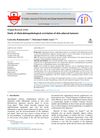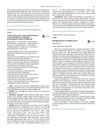January 2017 in “International Journal of Trichology” Vitamin D supplements might help reduce hair fall.
 72 citations,
January 2003 in “American Journal of Pathology”
72 citations,
January 2003 in “American Journal of Pathology” A protein called CBP is found in prostate cancer and can increase the effectiveness of certain prostate cancer treatments.
 522 citations,
January 2001 in “Cancer investigation”
522 citations,
January 2001 in “Cancer investigation” Doxil is an effective, modified chemotherapy drug with a unique toxicity profile and shows promise in treating certain cancers.
 January 2017 in “Journal of clinical & experimental dermatology research”
January 2017 in “Journal of clinical & experimental dermatology research” Scientists have found a way to create hair follicles from human stem cells, which could potentially be used to treat hair loss.
 7 citations,
August 2023 in “Journal of the American Academy of Dermatology”
7 citations,
August 2023 in “Journal of the American Academy of Dermatology” JAK inhibitors offer new hope for treating severe alopecia areata.
 May 2019 in “The Journal of Sexual Medicine”
May 2019 in “The Journal of Sexual Medicine” Drinking alcohol before taking flibanserin does not increase the risk of severe low blood pressure or fainting.
 November 2024 in “Journal of Scientific Agriculture”
November 2024 in “Journal of Scientific Agriculture” Silk proteins are great for cosmetics because they protect and improve skin and hair while being eco-friendly.
 1 citations,
September 2019 in “Journal of Investigative Dermatology”
1 citations,
September 2019 in “Journal of Investigative Dermatology” The research showed that CRISPR/Cas9 can fix mutations causing a skin disease in stem cells, which then improved skin grafts in mice, but more work on safety and efficiency is needed.

Detailed history and physical examination are crucial for diagnosing hair loss.
 2 citations,
September 2022 in “Frontiers in Immunology”
2 citations,
September 2022 in “Frontiers in Immunology” T-regulatory cells are important for skin health and can affect hair growth and reduce skin inflammation.
 87 citations,
March 2011 in “Australasian Journal of Dermatology”
87 citations,
March 2011 in “Australasian Journal of Dermatology” Genetics and hormones play a role in male and female hair loss, but more research is needed to fully understand it.
 12 citations,
March 2020 in “Journal of Bioactive and Compatible Polymers”
12 citations,
March 2020 in “Journal of Bioactive and Compatible Polymers” Nanoparticles show potential for controlled release of hair loss drugs, improving treatment effectiveness.
May 2024 in “Frontiers in Nutrition” Turning food waste into useful products is key for a sustainable economy.
 44 citations,
September 2019 in “The EMBO Journal”
44 citations,
September 2019 in “The EMBO Journal” Lymphatic vessels are essential for hair follicle growth and skin regeneration.
 June 2022 in “IP Indian journal of clinical and experimental dermatology”
June 2022 in “IP Indian journal of clinical and experimental dermatology” Benign skin adnexal tumors are more common than malignant ones, with trichoepithelioma and chondroid syringoma being the most frequent types.
 September 2023 in “Journal of The American Academy of Dermatology”
September 2023 in “Journal of The American Academy of Dermatology” People were generally happy with the home light therapy devices for hair loss.
 15 citations,
April 2016 in “Eye”
15 citations,
April 2016 in “Eye” Finasteride effectively treats central serous chorioretinopathy.
February 2020 in “Jurnal pendidikan dan keluarga/Jurnal Pendidikan dan Keluarga” Avocados and virgin coconut oil significantly reduce hair loss.
 4 citations,
May 2019 in “Physiology & Behavior”
4 citations,
May 2019 in “Physiology & Behavior” Cocaine impairs male sexual behavior and alters testosterone metabolism in the brain.
214 citations,
April 2017 in “Cell” Different small areas within hair follicles send specific signals that control what type of cells stem cells become.

Minoxidil nanoliposomes boost hair growth and reduce scalp bacteria better than regular minoxidil.
 1 citations,
December 2017 in “Journal of clinical and investigative dermatology”
1 citations,
December 2017 in “Journal of clinical and investigative dermatology” Platelet-Rich Plasma (PRP) treatment can significantly increase hair count and thickness in people with Androgenetic Alopecia (AGA) with minimal side effects.
 June 2023 in “Research Square (Research Square)”
June 2023 in “Research Square (Research Square)” Hair loss in male pattern baldness is linked to changes in immune cell behavior around hair follicles.
 January 2024 in “Journal of Ayurveda and integrative medicine”
January 2024 in “Journal of Ayurveda and integrative medicine” Millets may help reduce chemotherapy side effects like nausea, fatigue, and hair loss.
 August 2022 in “Italian Journal of Animal Science/Italian journal of animal science”
August 2022 in “Italian Journal of Animal Science/Italian journal of animal science” Field bean supplementation improved mohair growth and kid growth in Angora goats but didn't prevent weight loss after giving birth.
 11 citations,
January 2011 in “Indian Dermatology Online Journal”
11 citations,
January 2011 in “Indian Dermatology Online Journal” Eating dairy and high glycemic foods may increase the risk of acne.
 2 citations,
April 2019 in “Acta medica Philippina/Acta Medica Philippina”
2 citations,
April 2019 in “Acta medica Philippina/Acta Medica Philippina” People with alopecia areata often have lower vitamin D levels than healthy people.
 14 citations,
May 2014 in “Archives of plastic surgery”
14 citations,
May 2014 in “Archives of plastic surgery” The position of the parietal whorl can predict safe donor areas for hair transplants in Korean men with male pattern baldness.
 September 2012 in “Faculty Opinions – Post-Publication Peer Review of the Biomedical Literature”
September 2012 in “Faculty Opinions – Post-Publication Peer Review of the Biomedical Literature” Scientists successfully created fully functional hair follicles using bioengineering methods and stem cells.
 2 citations,
May 2017 in “Maturitas”
2 citations,
May 2017 in “Maturitas” Women with premature ovarian insufficiency have a worse cardiovascular risk profile than premenopausal women.

























